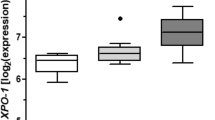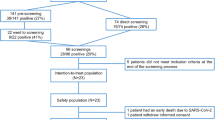Abstract
Purpose
Dedifferentiated liposarcoma (DDLPS) is a soft tissue malignancy characterized by amplification of the mouse double minute 2 homolog (MDM2) gene. MDM2 is a negative regulator of tumor protein 53 (TP53). We tested the in vivo efficacy of BI-907828, a small molecule inhibitor of the MDM2-TP53 interaction, in two DDLPS patient-derived xenografts (PDX).
Methods
Partially immunodeficient mice were bilaterally engrafted with UZLX-STS3 (n = 24) and UZLX-STS5 (n = 24) human DDLPS tissue harboring MDM2 amplifications. Mice were grouped as follows: (a) vehicle (0.5% hydroxyethylcellullose) 10 ml/kg daily per os (p.o.); (b) doxorubicin 5 mg/kg weekly intraperitoneally (i.p.); (c) BI-907828 2.5 mg/kg daily p.o. and (d) BI-907828 10 mg/kg daily p.o. The treatment lasted for 15 days, all mice treated with BI-907828 were followed for 37 days post-treatment. Efficacy was assessed by tumor volume and histopathological evaluation.
Results
The 15-day treatment with 2.5 mg/kg and 10 mg/kg BI-907828 significantly inhibited tumor growth in UZLX-STS5 and -STS3 (p < 0.0001 compared to control for both models). All UZLX-STS5 and -STS3 tumors treated with BI-907828 decreased in size during treatment, and BI-907828-treated UZLX-STS5 tumors even disappeared completely. During the follow-up period, no tumor regrowth was observed in the UZLX-STS5 model and both doses of BI-907828 led to a pathological complete response, whereas a dose-dependent regrowth was seen in the UZLX-STS3 model.
Conclusion
BI-907828 showed significant anti-tumor activity in DDLPS PDX harboring MDM2 amplifications, providing a strong rationale for early clinical testing of BI-907828 in a DDLPS patient population.





Similar content being viewed by others
References
Fletcher CD, Bridge JA, Hogendoorn PC, Mertens F. WHO classification of tumours of soft tissue and bone. Lyon: IARC Press; 2013.
Henricks WH, Chu YC, Goldblum JR, Weis SW. Dedifferentiated liposarcoma: a clinicopathological analysis of 155 cases with a proposal for an expanded definition of dedifferentiation. Am J Surg Pathol. 1997;21:271–81.
Judson I, Verweij J, Gelderblom H, Hartmann JT, Schöffski P, Blay JY, et al. Doxorubicin alone versus intensified doxorubicin plus ifosfamide for first-line treatment of advanced or metastatic soft-tissue sarcoma: a randomised controlled phase 3 trial. Lancet Oncol. 2014;15:415–23.
Schöffski P, Cornillie J, Wozniak A, Li H, Hompes D. Soft tissue sarcoma: an update on systemic treatment options for patients with advanced disease. Oncol Res Treat. 2014;37:355–62.
Italiano A, Toulmonde M, Cioffi A, Penel N, Isambert N, Bompas E, et al. Advanced well-differentiated/dedifferentiated liposarcomas: role of chemotherapy and survival. Ann Oncol. 2012;23:1601–7.
Oliner JD, Kinzler KW, Meltzer PS, George DL, Vogelstein B. Amplification of a gene encoding a p53-associated protein in human sarcomas. Nature. 1992;358:80–3.
Vassilev LT, Vu BT, Graves B, Carvajal D, Podlaski F, Filipovic Z, et al. In vivo activation of the p53 pathway by small-molecule antagonists of MDM2. Science. 2004;303:844–8.
Burgess A, Chia KM, Haupt S, Thomas D, Haupt Y, Lim E. Clinical overview of MDM2/X-targeted therapies. Front Oncol. 2016;6:7.
Tovar C, Graves B, Packman K, Filipovic Z, Higgins B, Xia M, et al. MDM2 small-molecule antagonist RG7112 activates p53 signaling and regresses human tumors in preclinical cancer models. Cancer Res. 2013;73:2587–97.
Ray-Coquard I, Blay JY, Italiano A, Le Cesne A, Penel N, Zhi J, et al. Effect of the MDM2 antagonist RG7112 on the P53 pathway in patients with MDM2-amplified, well-differentiated or dedifferentiated liposarcoma: an exploratory proof-of-mechanism study. Lancet Oncol. 2012;13:1133–40.
Andreeff M, Kelly KR, Yee K, Assouline S, Strair R, Popplewell L, et al. Results of a phase I trial of RG7112, a small-molecule MDM2 antagonist in leukemia. Clin Cancer Res. 2016;22:868–76.
Kurzrock R, Blay JY, Nguyen BB, Wagner AJ, Maki RG, Schwartz GK et al. A phase I study of MDM2 antagonist RG7112 in patient (pts) with relapsed/refractory solid tumors. J Clin Oncol 2012;30(suppl; abstr e13600).
Chawla SP, Blay JY, Italiano A, Guttierez M, Le Cesne A, Gomez-Roca CA et al. Phase Ib study of RG7112 with doxorubicin (D) in advanced soft tissue sarcoma (ASTS). J Clin Oncol 2013;31(suppl; abstr 10514).
Bill KL, Garnett J, Meaux I, Ma X, Creighton CJ, Bolshakov S, et al. SAR405838: a novel and potent inhibitor of the MDM2:p53 axis for the treatment of dedifferentiated liposarcoma. Clin Cancer Res. 2016;22:1150–60.
Furet P, Masuya K, Kallen J, Stachyra-Valat T, Ruetz S, Guagnano V, et al. Discovery of a novel class of highly potent inhibitors of the p53-MDM2 interaction by structure-based design starting from a conformational argument. Bioorg Med Chem Lett. 2016;26:4837–41.
de Jonge M, de Weger VA, Dickson MA, Langenberg M, Le Cesne A, Wagner AJ, et al. A phase I study of SAR405838, a novel human double minute 2 (HDM2) antagonist, in patients with solid tumours. Eur J Cancer. 2017;76:144–51.
Iancu-Rubin C, Mosoyan G, Glenn K, Gordon RE, Nichols GL, Hoffman R. Activation of p53 by the MDM2 inhibitor RG7112 impairs thrombopoiesis. Exp Hematol. 2014;42:137–45.
Mahfoudhi E, Lordier L, Marty C, Pan J, Roy A, Roy L, et al. P53 activation inhibits all types of hematopoietic progenitors and all stages of megakaryopoiesis. Oncotarget. 2016;7:31980–92.
Rinnenthal J, Rudolph D, Blake S, Gollner A, Wernitznig A, Weyer-Czernilofsky U et al. BI 907828: a highly potent MDM2 inhibitor with low human dose estimation, designed for high dose intermittent schedules in the clinic. AACR Annual Meeting, Chicago, IL, USA; April 14–18, 2018; abstract #4865.
Rudolph D, Gollner A, Blake S, Rinnenthal J, Wernitznig A, Weyer-Czernilofsky U et al. BI 907828: a novel, potent MDM2 inhibitor that is suitable for high-dose intermittent schedules. AACR Annual Meeting, Chicago, IL, USA; April 14–18, 2018; abstract #4868.
Rudolph D, Reschke M, Blake S, Rinnenthal J, Wernitznig A, Weyer-Czernilofsky U et al. BI 907828: a novel, potent MDM2 inhibitor that induces anti-tumor immunological memory and acts synergistically with an anti-PD1 antibody in syngeneic mouse models of cancer. AACR Annual Meeting, Chicago, IL, USA; April 14–18, 2018; abstract #4866.
Li H, Wozniak A, Sciot R, Cornillie J, Wellens J, Van Looy T, et al. Pazopanib, a receptor tyrosine kinase inhibitor, suppresses tumor growth through angiogenesis in dedifferentiated liposarcoma xenograft models. Transl Oncol. 2014;7:665–71.
Cornillie J, Wozniak A, Pokreisz P, Casazza A, Vreys L, Wellens J, et al. In vivo antitumoral efficacy of PhAc-ALGP-doxorubicin, an enzyme-activated doxorubicin prodrug, in patient-derived soft tissue sarcoma xenograft models. Mol Cancer Ther. 2017;16:1566–75.
Cornillie J, Wozniak A, Li H, Wang Y, Boeckx B, Gebreyohannes YK, et al. XenoSarc: a panel of histologically and molecularly stable soft tissue sarcoma xenograft models for biological studies and preclinical drug testing. Mol Cancer Ther. 2019. https://doi.org/10.1158/1535-7163.mct-18-1045.
Rana T, Chakrabarti A, Freeman M, Biswas S. Doxorubicin-mediated bone loss in breast cancer bone metastases is driven by an interplay between oxidative stress and induction of TGFβ. PLoS ONE. 2013;8:e78043.
Oliveira MS, Melo MB, Carvalho JL, Melo IM, Lavor MS, Domes DA, et al. Doxorubicin cardiotoxicity and cardiac function improvement after stem cell therapy diagnosed by strain echocardiography. J Cancer Sci Ther. 2013;5:52–7.
Aziz MH, Shen H, Maki CG. Acquisition of p53 mutations in response to the non-genotoxic p53 activator nutlin-3. Oncogene. 2011;30:4678–86.
Jones RJ, Bjorklund CC, Baladandayuthapani V, Kuhn DJ, Orlowski RZ. Drug resistance to inhibitors of the human double minute-2 E3 ligase is mediated by point mutations of p53, but can be overcome with the p53 targeting agent RITA. Mol Cancer Ther. 2012;11:2243–53.
Michaelis M, Rothweiler F, Barth S, Cinatl J, van Rikxoort M, Löschmann N, et al. Adaptation of cancer cells from different entities to the MDM2 inhibitor nutlin-3 results in the emergence of p53-mutated multi-drug-resistant cancer cells. Cell Death Dis. 2011;2:e243. https://doi.org/10.1038/cddis.2011.129.
Jung J, Lee JS, Dickson MA, Schwartz GK, Le Cesne A, Varga A, et al. TP53 mutations emerge with HDM2 inhibitor SAR405838 treatment in de-differentiated liposarcoma. Nat Commun. 2016;7:12609. https://doi.org/10.1038/ncomms12609.
Duffy MJ, Synnott NC, Crown J. Mutant p53 as a target for cancer treatment. Eur J Cancer. 2017;83:258–65.
Acknowledgements
Boehringer Ingelheim provided the drug and financial support for the study and was involved in the study design, but not in the collection, analysis and interpretation of data.
Author information
Authors and Affiliations
Corresponding author
Ethics declarations
Conflict of interest
P. Schöffski has received institutional support from Boehringer Ingelheim for advisory functions and educational activities.
Ethical approval
All applicable international, national, and/or institutional guidelines for the care and use of animals were followed. All procedures performed in studies involving animals were in accordance with the ethical standards of the institution at which the studies were conducted.
Informed consent
Informed consent was obtained from all individual participants included in the study.
Additional information
Publisher's Note
Springer Nature remains neutral with regard to jurisdictional claims in published maps and institutional affiliations.
Rights and permissions
About this article
Cite this article
Cornillie, J., Wozniak, A., Li, H. et al. Anti-tumor activity of the MDM2-TP53 inhibitor BI-907828 in dedifferentiated liposarcoma patient-derived xenograft models harboring MDM2 amplification. Clin Transl Oncol 22, 546–554 (2020). https://doi.org/10.1007/s12094-019-02158-z
Received:
Accepted:
Published:
Issue Date:
DOI: https://doi.org/10.1007/s12094-019-02158-z




